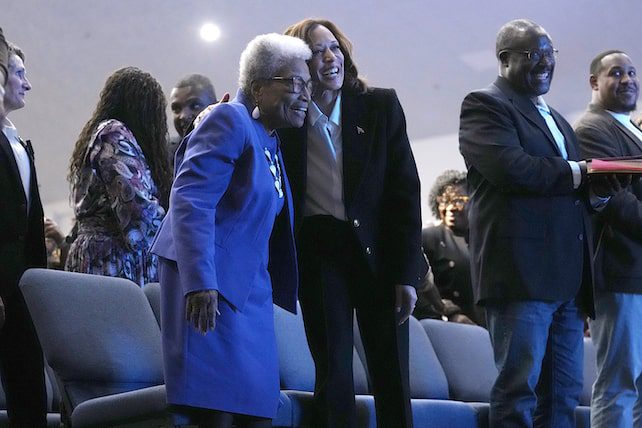(RNS) — When a Detroit pastor asked Vice President Kamala Harris on Tuesday (Oct. 15) about her alleged “lack of engagement” with Black church leaders, the Democratic presidential contender looked visibly taken aback. Harris rejected the accusation, calling it “misinformation” that originated with former President Donald Trump’s campaign. But the moment, coming during a town hall in Detroit organized by radio host Charlamagne tha God, showed her perceived vulnerability with Black voters.
“They are trying to disconnect me from the people I have worked with—that I am from,” said Harris, who has a connection to Hinduism through her mother but was also raised in the Black church and is a member of Third Baptist Church of San Francisco. She has “been actively engaged” with Black church leaders “throughout my career and as vice president,” including, she said pointedly, “recently.”
Indeed, Harris, who called her pastor, the Rev. Amos Brown, shortly before announcing her presidential campaign in July, made a blitz of campaign appearances meant to shore up support among Black churchgoers. It’s a familiar strategy for Democratic politicians, who have long visited Black churches near Election Day, hoping to maximize turnout among a critical segment of the party’s base.
But experts say Harris’ recent appearances in faith settings don’t measure the full scope of her outreach to Black Christians. While some analysts have raised concerns about lagging support for the vice president among Black men especially, others told RNS she has been quietly courting African American support in multiple ways for some time.
Harris recently launched a “Souls to the Polls” initiative to magnify the voter participation efforts Black churches have organized for decades, and her campaign has established a faith advisory board that features Brown and nine other faith leaders tasked with connecting with Black churches in swing states.
Her appearance with Charlamagne tha God came on the heels of a visit Sunday to Koinonia Christian Center, a church in Greenville, North Carolina, where a packed congregation clapped and shouted boisterously throughout her address. Harris told the congregation that she learned at an early age to think of faith as “a verb” and that believers “show up in action and in service.” While lamenting the damage wrought across the state last month by Hurricane Helene, the vice president repeatedly referred to Scripture.
Citing the New Testament’s Epistle to the Galatians, Harris said the Apostle Paul “reminded them and us, that God calls us not to become weary of doing good. Because we each have the power, God tells us this, the power, each one of us, to make a difference.”
She concluded by quoting from the Book of Psalms: “Let us always remember that while weeping may endure for a night, joy cometh in the morning.”
Anthea Butler, a historian of African American and American religion at the University of Pennsylvania, said Harris has touched Black Christians in less obvious ways, pointing to Harris’ decision not to attend Israeli Prime Minister Benjamin Netanyahu’s address to Congress in July. The move, Butler argued, likely resonated with Black church leaders who have been vocally critical of the Biden administration’s support for Israel’s military actions in the Gaza Strip.
Equally as telling, Butler said, was the event Harris chose to attend instead of the Netanyahu speech: An event for the Zeta Phi Beta sorority, one of the “Divine 9” Black sororities and fraternities that are seen as cultural powerhouses in the African American community.

